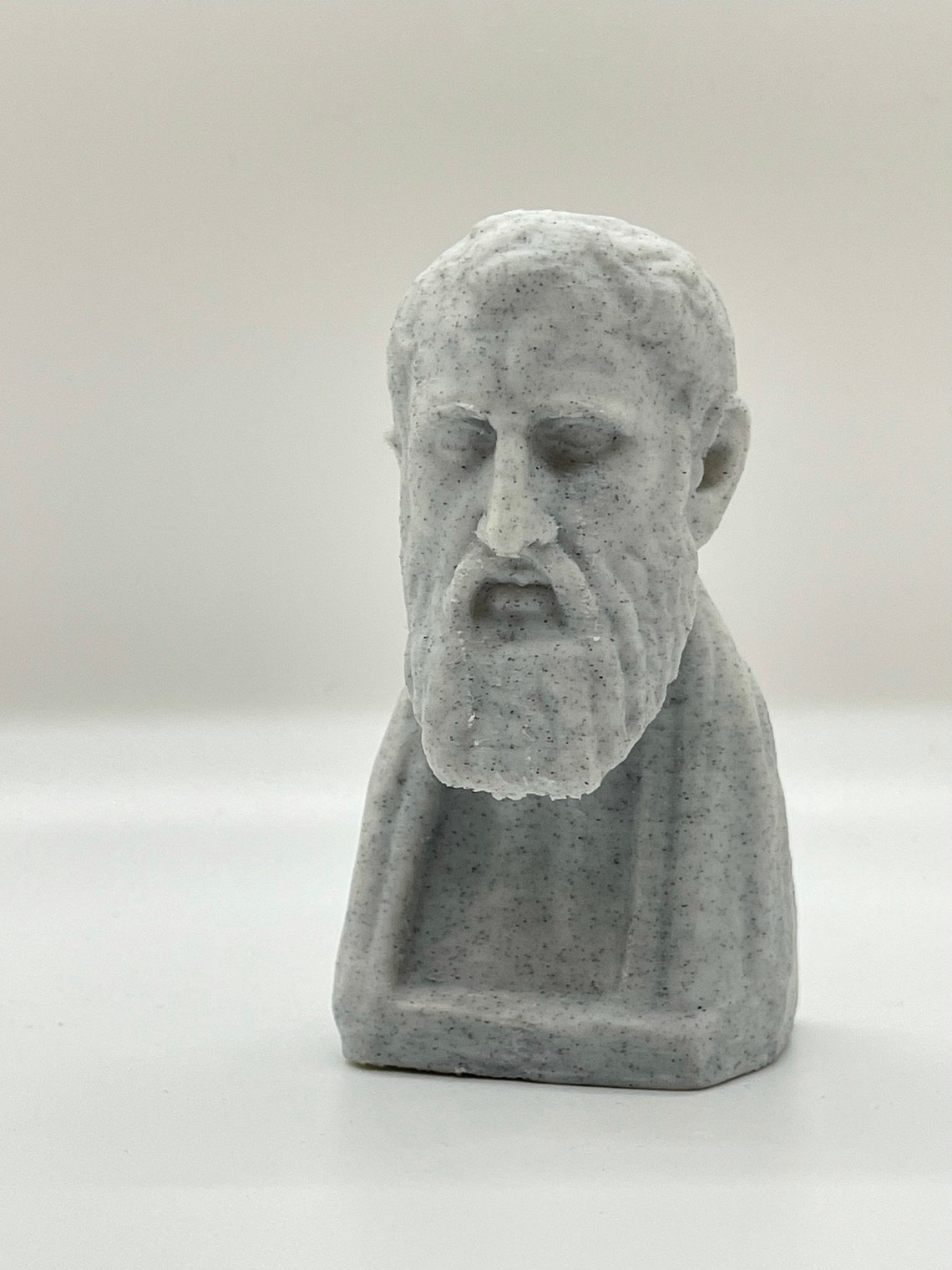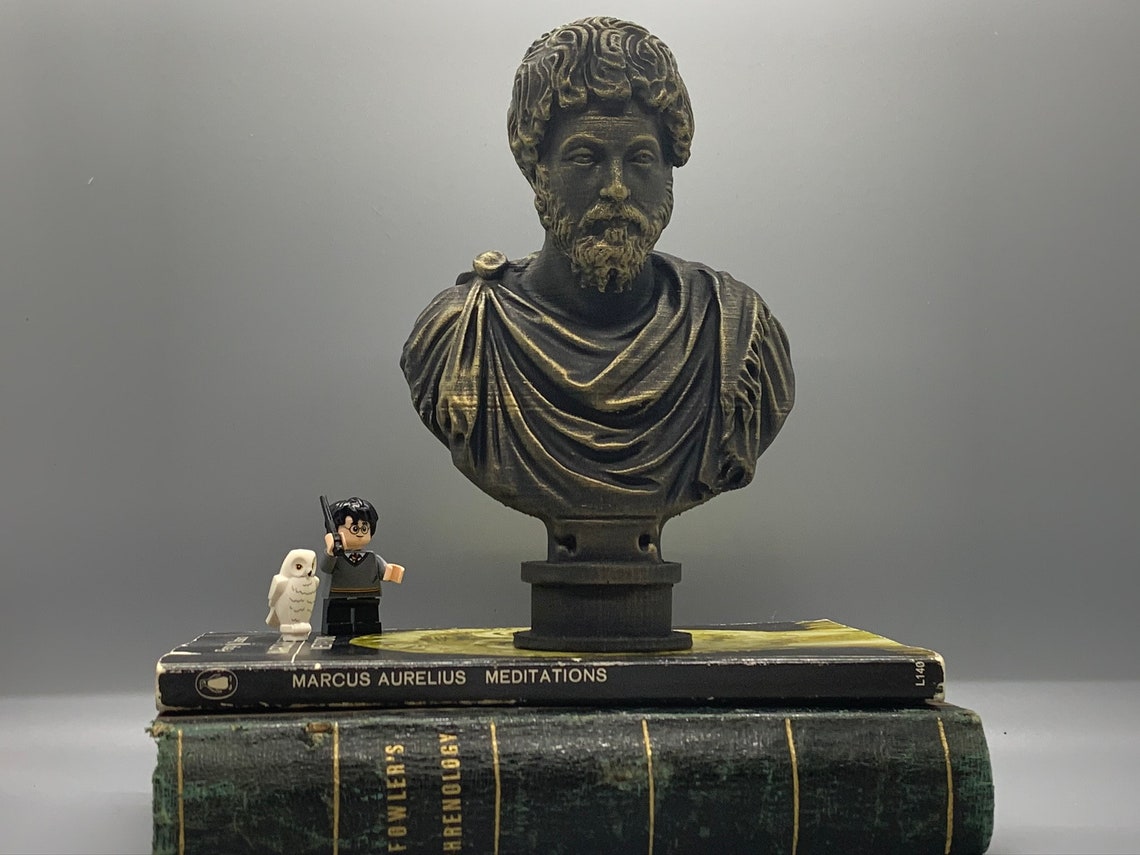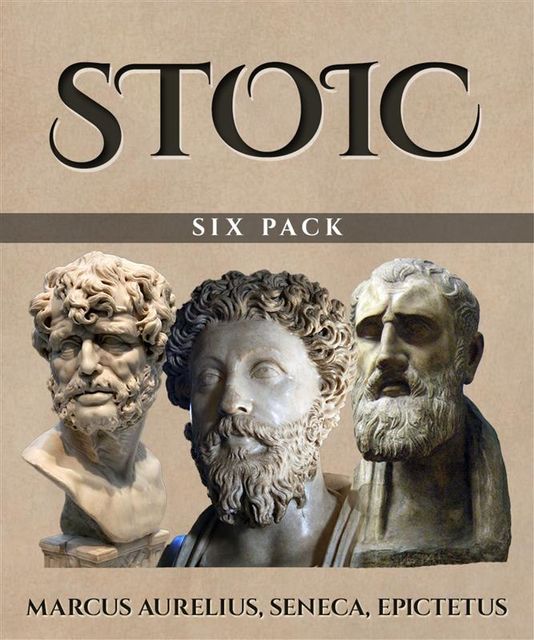
Gateway to the Stoics Marcus Aurelius's Meditations, Epictetus's Enchiridion, and Selections
Marcus Aurelius was emperor of Rome. His untitled writing, commonly known as Meditations is an important source of Stoic philosophy. "The impediment to action advances action. What stands in the way becomes the way." He means that everything, no matter whether it is good or bad is an opportunity to practice virtue.

four busturines of men are sitting on a table
By Jacob Bell, Associate Editor, Classical Wisdom Epictetus was a Stoic philosopher that lived from 55-135 CE. He came before Marcus Aurelius and after Seneca. Epictetus was a slave for much of his youth and began studying philosophy under Musonius Rufus during his enslavement. He gained his freedom sometime after the death of Emperor Nero

Stoic Statue Set Marcus Aurelius Statue Seneca Epictetus Etsy
Stoicism is a school of Hellenistic philosophy that flourished in Ancient Greece and Ancient Rome. The Stoics believed that the practice of virtue is enough to achieve eudaimonia: a well-lived life. The Stoics identified the path to achieving it with a life spent practicing the four virtues in everyday life: wisdom, courage, temperance or moderation, and justice, and living in accordance with.

Stoic Quote Collection Marcus Aurelius Epictetus Seneca YouTube
The remaining chapters follow a (roughly) chronological sequence: c. 3,"Cicero and his contemporaries," c. 4, "Lucretius and the Epicureans," c. 5, "Philosophers and poets in the Augustan Age," c. 6, "Seneca and his contemporaries," c. 7, "Stoicism under Nero and the Flavians," and c. 8, "From Epictetus to Marcus Aurelius."

Marcus Aurelius Skulptur Büste Kostenloses Foto auf Pixabay Pixabay
This is part of our 3-part series on the three most important Stoic philosophers: Marcus Aurelius, Seneca and Epictetus. Here you will find a short introduction to Seneca, suggested readings, three exercises/lessons from him as well as a selection of quotes. You can also read our introduction to Stoicism if you are not familiar with the […]

Stoicism Collection Meditations, On the Shortness of Life, and Enchiridion by Marcus Aurelius
Oct 23, 2023. Stoicism, the ancient Greco-Roman philosophy of life, has experienced a revival in modern times. At the heart of its enduring appeal are three remarkable figures: Seneca, Epictetus, and Marcus Aurelius. Each brought unique perspectives and contributions, weaving a multifaceted portrait of Stoic thought.

Stoic Statue Set Marcus Aurelius Statue Seneca Epictetus Etsy
What stands in the way becomes the way.". Discourses and Selected Writings by Epictetus. Of the big three (Seneca, Marcus Aurelius, Epictetus), Epictetus is the most preachy and for many, the least fun to read. That doesn't mean he isn't brilliant. On many occasions he expresses something so clearly and profoundly that it will shake you.

Buy Three Stoic Classics Meditations by Marcus Aurelius; The Shortness of Life by Seneca
Marcus Aurelius (born April 26, 121 ce, Rome [Italy]—died March 17, 180, Vindobona [Vienna, Austria] or Sirmium, Pannonia) was a Roman emperor (161-180), best known for his Meditations on Stoic philosophy. Marcus Aurelius has symbolized for many generations in the West the Golden Age of the Roman Empire.

The GREATEST LIFECHANGING Stoic Lessons in ADVERSITY [Epictetus Seneca Marcus Aurelius
Differentiating between key Stoics. At first blush, the major Stoics - Epictetus, Marcus Aurelius, and Seneca - seem quite similar in the somewhat limited selections of their works that I have read. Gen. Mattis carries Marcus Aurelius, Navy hero, James Stockdale survived on Epictetus, Prof. Margaret Graver on a personal level seems to favor.

The Stoics Biographies of Marcus Aurelius, Seneca, Epictetus, Cato, and Zeno
The strong comeback that Stoicism has made in the past twenty years or so is mainly grounded in a short period of the early Roman Empire (30-180 CE), and is due to the work of only a few philosophers. We will focus our study on Seneca and Epictetus, with occasional glances at Marcus Aurelius, Musionus Rufus, and the original Athenian Stoics.
Greek and Roman stoicism and some of its disciples Epictetus, Seneca and Marcus Aurelius
Marcus Aurelius, Seneca, Epictetus. Publication date 1920 Usage Public Domain Mark 1.0 Topics Stoicism.Stoics, Seneca, Marcus Aurelius, Epictetus Collection folkscanomy_miscellaneous; folkscanomy; additional_collections Language English. The Stoic Bible Addeddate 2021-02-20 08:44:36

EP 174 Stoic Affirmations Marcus Aurelius Teachings of Epictetus Seneca Zeno Wisdom of
This is why we've read the same books for thousands of years. The Big Three. 1. Meditations by Marcus Aurelius. I loved this book. When I read it in university, I wasn't ready for the wisdom inside. On top of that, the translation was bad. You want the Hays one (linked above). Re-reading it was a breath of fresh air.

Stoic Statue Set, Marcus Aurelius Statue, Seneca, Epictetus, Zeno, Statue Decor, Historical
The ancient philosophers Seneca, Epictetus, and Marcus Aurelius were all masters of Stoicism, a philosophy that teaches us how to live a life of resilience in the face of adversity.

Stoicism an ancient philosophy with contemporary value The Skyline View
Born in Rome, in 121, Marcus Aurelius was one of the most respected emperors in Roman history. When he was 17, Aurelius was adopted by emperor Antonius Pius and succeeded him in A.D. 161. He ruled jointly with his adoptive brother, Lucius Verus, until 169, when he became sole emperor after Verus died. Although Aurelius was a humanitarian ruler.

Stoic Six Pack by Marcus Aurelius, Epictetus, Seneca Read Online on Bookmate
Think of Marcus Aurelius, the emperor of the Roman Empire holding one of the most powerful positions in the world. Think of Seneca, who was an adviser to an emperor, renowned playwright and one of the richest people in the Roman Empire. And then there is Epictetus, on the complete opposite, who was born as a slave.

Stoic Six Pack Meditations Of Marcus Aurelius The Golden Sayings Fragments And Discourses Of
Marcus Aurelius Antoninus (Latin: [ˈmaːrkʊs au̯ˈreːliʊs antoːˈniːnʊs]; English: / ɔː ˈ r iː l i ə s / aw-REE-lee-əs; 26 April 121 - 17 March 180) was Roman emperor from 161 to 180 and a Stoic philosopher. He was a member of the Nerva-Antonine dynasty, the last of the rulers later known as the Five Good Emperors and the last emperor of the Pax Romana, an age of relative.
- Hoe Snel Werkt Metacam Hond
- Sns Bank Bic Swift Code
- Super Mario World Super Nintendo Online
- Mystery Files Hidden Objects Walkthrough
- Feyenoord V1 Pec Vrouwen
- Jean Pierre Van Der Sluis Wikipedia
- Grand Prix Van Abu Dhabi
- Hoeveel Renners In De Tour 2023
- Jesus Christ Superstar Rock Musical
- Moet Je Naar Het Ziekenhuis Als Je Gedrogeerd Bent